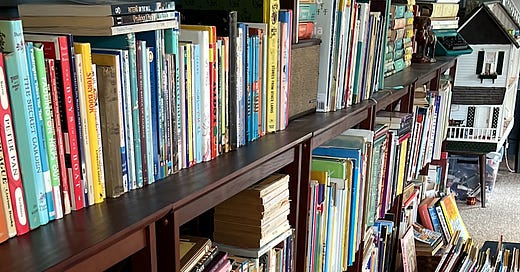This is a guest post from one of our best friends in this space, The Based Librarian. We welcome guest submissions (anonymous, if necessary, as we’ve done here) from individuals working in libraries, publishing, and more. Please be in touch with us!
Many of us remember the days when libraries were safe places where children could peruse the shelves and pick out books that pique their interest and excite their minds for a new read. A new book meant a new world, new characters, and maybe even a beautiful message or moral that lends itself to a growing mind. Unfortunately, this safe and innocent place has become tainted. While wonderful books are still on the shelves, parents have to be wary of what is also there to pollute, confuse, and indoctrinate our youth. We have seen the images of these books floating around on the Internet that show adult topics in picture books with pride flags and drag queens and images of teen graphic novels that add another meaning to the word graphic. You may think that your local library or your kid’s school library is immune to these types of materials if your town is more conservative and/or smaller in size, but this may not be the case. Here’s why…
The field of librarianship is not what it used to be. A librarian has typically been known as kind, helpful, and not at all controversial, but the culture of the field has changed. Instead, your typical librarian today may be an individual with brightly colored hair, pronouns on his or her name tag, and a repertoire of “inclusive” books to put on display or suggest for your kids. She may resemble an activist more so than an actual librarian. It is also likely your librarian has a degree in Library Science from an ALA-accredited program which makes him or her a “certified” librarian in your state. This is a requirement for the majority of librarian jobs in the country, and it is the primary reason that you may see inappropriate and agenda-driven material in your local library, even if you thought it could never happen there.
The ALA, the American Library Association, was the first library organization formed in the United States and establishes the policies and practices by which the majority of libraries follow, including even your small-town library. While not every person that works in the library field is certified by the ALA, they are likely overseen by a library system that adheres to the guidelines put forth by the organization. Once you look into what the ALA stands for, it is easy to see why libraries are becoming a place for activism.
The ALA establishes in the Library Bill of Rights that its main goal is access - but their definition of access means that there are no boundaries or restrictions for children. Not only this, but the ALA encourages kids to “read banned books” from its Most Challenged Books list, which includes highly sexually explicit materials - a few of which are visually graphic in the form of graphic novels. The organization also encourages librarians to promote this list and promote Banned Books Week. Any questioning of this practice is shut down as “censorship!”
The ALA is also known for its Stonewall Book Awards, which highlight LGBTQIA+ books, and annual book lists such as the Rainbow Book List which “represents an array of diverse stories and identities representing the LGBTQIA+ youth experience.” Notably, this book list only includes recommended titles for youth - not adults. These are used by many librarians to make book selections for their libraries. You’ll see these selections on display next month during Pride Month.
And perhaps most significantly, the ALA has now elected a self-proclaimed “lesbian Marxist” as its next president. The president-elect, Emily Drabinski, has recently stated that she is going to have “the gayest inauguration brunch in the history of libraries…” in response to the latest book challenges.
As a librarian, what advice do I have for you if you want to save your library from the abyss of wokeness? Get involved! Serve as a library trustee, attend city council and library board meetings, and/or make book suggestions to your library for purchase that reflect your values. And support platforms like @RightBooks4Kids that help parents sift through the muddied collections and find the gems!
The Based Librarian works at her local U.S. library and highlights the state of literature and libraries online. You can follow her on Twitter @BasedLibrarian and on Instagram @thebasedlibrarian.





